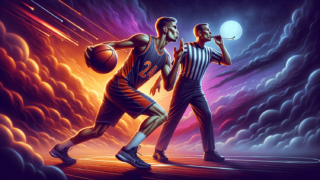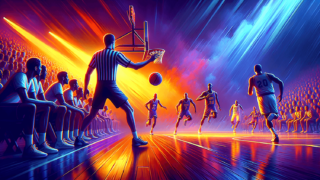
Pre-Game Technical Foul Rule in Basketball
Written by: Basketball Universe
Last updated:

Ready for a deep dive into one of the peculiar yet intriguing aspects of basketball: the Pre-Game Technical Foul Rule? Grab your whistles and let’s blow the lid off this fascinating rule that can change the game even before it begins! It’s not often that fans witness a pre-game technical foul, but when the moment arrives, it’s crucial to understand how it works and the impact it can have on the game. In this stimulating article, we’ll dissect the pre-game technical foul rule to satisfy your curiosity and make you the go-to hoops guru among your friends. Buckle up, basketball fans, and let’s jump right into this thrilling topic!
Pre-Game Technical Foul Rule in Basketball
The Pre-Game Technical Foul Rule in basketball refers to a technical foul assessed to a player or coach for any unsportsmanlike or inappropriate behavior before the game has officially started. This can include everything from fighting, using profanity, or delaying the start of the game. The opposing team is awarded a single free throw attempt, and the game begins with a jump ball, regardless of the result of the free throw.
Origins of the Pre-Game Technical Foul Rule
Before we go any further, let’s start with a little history. The pre-game technical foul rule has its origins in the overall development of basketball rules, specifically aimed at maintaining a respectful and sportsmanlike atmosphere. Throughout the years, the National Basketball Association (NBA), the International Basketball Federation (FIBA), and other sports organizations have continually fine-tuned the rules to address various issues arising in the game, including pre-game confrontations and unsportsmanlike behavior.
Understanding Technical Fouls
To fully appreciate the pre-game technical foul rule, it’s essential to grasp the concept of technical fouls in general. Technical fouls are assessed for various reasons, including unsportsmanlike conduct, delay of game violations, and illegal substitutions. While a personal foul involves physical contact between players, a technical foul represents a breach of the game’s code of conduct, fair-play expectations, and game administration.
Team and Individual Technical Fouls
Technical fouls can be further divided into two categories: team and individual technical fouls. An individual technical foul typically stems from a player’s or coach’s disrespect, inappropriate behavior, or unsportsmanlike conduct towards an opponent, match official, or spectator. A team technical foul often results from a team’s collective violation of basketball rules or any other failure to meet game expectations, such as too many players on the court or delay of game.
Different Pre-Game Scenarios Leading to Technical Fouls
Now that we’ve covered the basics of technical fouls, let’s look at various pre-game scenarios that can lead to the assessment of a pre-game technical foul under basketball rules. From mundane matters to heated exchanges, the pre-game technical foul rule ensures that players and coaches adhere to the game’s etiquette and decorum right from the start.
Altercations and Physical Confrontations
One of the primary reasons for a pre-game technical foul is an altercation or physical confrontation between players or coaches before the game starts. Whether it’s a heated exchange of words or a full-blown fight, the offending individual(s) will be assessed a pre-game technical foul. Match officials take such incidents seriously, as they set the tone for the rest of the game, and must enforce basketball rules around sportsmanship.
Vulgar Language and Disrespect
Using profanities, inappropriate language, or showing disrespect towards match officials, opponents, or teammates can also lead to a pre-game technical foul. The game of basketball adheres to a high standard of sportsmanlike conduct, and poor behavior before the game is not tolerated.
Delay of Game Violations
Another reason for pre-game technical fouls can be delay of game issues. For example, if a team fails to submit its starting line-up to the scorers’ table on time or is not prepared to start the game when required, the officials can assess a pre-game technical foul. This rule ensures that teams adhere to the set pre-game timeline and that the game begins promptly.
Enforcing the Pre-Game Technical Foul Rule
With a clear understanding of why pre-game technical fouls are assessed, let’s explore how this rule is enforced and its consequences. The pre-game technical foul rule not only preserves a game’s overall spirit and atmosphere but also has critical implications for both the offending team and its opponents.
Assessing the Foul
When a match official observes unsportsmanlike behavior, they can call for a pre-game technical foul. The referee’s decision is final, and the foul is recorded in the official scorebook. The scorers and other officials will also be informed of the assessed foul.
The Penalty
For the pre-game technical foul, the opposing team is awarded a single free-throw attempt, which can be shot by any player listed in the official scorebook. The chosen player stands at the free-throw line and aims to score one point for their team.
The Jump Ball and Game Commencement
After the free throw, the game begins with a jump ball at the center court, no matter the result of the free-throw attempt. The jump ball is contested between two opposing players – one from each team – as they try to gain possession for their team. The referee throws the ball vertically between the players, who jump and try to tap it to one of their teammates. Following the jump ball, the game proceeds according to regular basketball rules.
Impact of Pre-Game Technical Fouls on the Game
Now that we’ve seen how the pre-game technical foul rule is enforced, let’s delve into its impact on the game. The effects can range from creating an early advantage to influencing the overall tone and flow of the game.
Early Points on the Board
The most immediate and tangible impact of a pre-game technical foul is that the opposing team has the opportunity to earn a point before the game begins, creating an early lead. While one point may not seem like much, it can set the stage for a match-up and give the team an early advantage.
Influencing Team Morale and Dynamics
Pre-game technical fouls can also have psychological effects on both teams. For the team that has been assessed the foul, it can create tension within the team, particularly if the incident involves a key player, a coach, or multiple players. The offending team may feel the pressure to perform and make up for the early setback, giving them extra motivation to excel. Conversely, the team awarded the free throw may begin the game with greater confidence given the early advantage.
Shaping the Game’s Atmosphere
Lastly, the pre-game technical foul can set the tone for the entire game. If the foul results from a heated altercation or a controversial incident, it can create a tense atmosphere between the teams, resulting in a more aggressive and fiercely competitive match-up. In other cases, it can serve as a reminder for both teams to maintain their composure and practice good sportsmanship throughout the game.
Notable Pre-Game Technical Fouls in Basketball History
While pre-game technical fouls are not an everyday occurrence in basketball, they can undoubtedly create memorable moments when they happen. Let’s take a look at some notable pre-game technical fouls in basketball history that have piqued fans’ interest and shaped the narrative of the game.
Miami Heat vs. Indiana Pacers – April 4, 2008
In this game, a pre-game technical foul was assessed to the Miami Heat player, Ricky Davis. The reason? Ricky decided to try scoring on the opposing team’s basket just before the game started. The peculiar action led to a pre-game technical foul, and the Indiana Pacers’ Troy Murphy made the awarded free throw even before the official clock started.
Phoenix Suns vs. Milwaukee Bucks – February 2, 2020
In a 2020 game, Phoenix Suns’ Devin Booker and Milwaukee Bucks’ Donte DiVincenzo were caught in a brief altercation during the pre-game shootaround. The scuffle led to a pre-game technical foul being assessed to Booker. Milwaukee Bucks’ Giannis Antetokounmpo was granted the free throw attempt for his team and successfully scored a point before the game’s commencement.
Wrapping Up
There you have it – a comprehensive look at the pre-game technical foul rule in basketball. Although it’s not an everyday occurrence, this fascinating rule ensures that players and coaches adhere to the expected level of sportsmanship and respect even before the game has started. The next time you gather with your friends to watch a game, you’ll be well-equipped to expertly explain the pre-game technical foul rule and its implications—the ultimate basketball expert in your crew!
Role of Match Officials in Pre-Game Technical Fouls
Match officials play a crucial role in ensuring that pre-game technical fouls are assessed and enforced correctly. Let’s examine their role and the various responsibilities that come with the territory.
Observing and Assessing the Situation
Before the game starts, match officials should be vigilant and keep a close eye on the behavior and conduct of players and coaches. As the guardians of basketball rules, officials must assess any inappropriate, unsportsmanlike, or disrespectful actions and make a judgment call on whether a pre-game technical foul is warranted.
Communicating the Decision
Once a decision is made, match officials must communicate the assessed pre-game technical foul to both teams, as well as the scorers and other game staff. Clear and effective communication is crucial, as it ensures that all parties are aware of the situation and can abide by the appropriate procedure following the foul.
Maintaining Control and Fair Play
Finally, match officials should maintain control and foster a sense of fair play throughout the pre-game phase, ensuring that the spirit of the game is preserved. By taking timely actions in case of any unsportsmanlike behavior and enforcing basketball rules, they can create an environment where players and coaches feel encouraged to compete fairly and respectfully, right from the outset.
Preventing Pre-Game Technical Fouls
Now that we’ve explored the numerous aspects of pre-game technical fouls, how can players, coaches, and teams work together to prevent them? Here are some tips for maintaining a positive pre-game atmosphere and ensuring that everyone can focus on the game itself:
Maintaining Composure and Discipline
Players and coaches should emphasize the importance of remaining composed and disciplined during the pre-game phase. It’s crucial to address any personal or team issues before stepping onto the court, ensuring that emotions don’t interfere with the game. By emphasizing respect and sportsmanship, coaches can lead by example and make it clear that inappropriate behavior will not be tolerated.
Focusing on Warm-Ups and Strategy
By concentrating on warm-ups, team strategy, and game objectives during the pre-game phase, players and coaches can avoid distractions and be better prepared to start the game on the right foot. Maintaining focus and prioritizing performance can help minimize the chances of a pre-game technical foul being called.
Building Positive Relationships with Opponents
Developing a sense of mutual trust and respect with opponents can also help prevent pre-game technical fouls. By engaging in friendly conversations, exchanging pleasantries, or even acknowledging the competition with a simple nod or gesture, players and coaches can establish and maintain positive relationships, paving the way for a fair and enjoyable game experience for everyone involved.
Pre-Game Rituals and Their Impact on Technical Fouls
Pre-game rituals are an essential part of basketball culture, with teams and players alike observing their own unique routines to mentally prepare for the game ahead. While these rituals can serve as a source of motivation and focus, they can also contribute to pre-game technical fouls if players or coaches violate the rules during the process.
Rituals Requiring Approval
Certain pre-game rituals, such as pyrotechnics, light shows, or elaborate introductions, may require approval from game officials or the hosting venue. Teams should ensure that they have the necessary permissions before engaging in these rituals to avoid unintentional pre-game technical fouls.
Respecting Opponents and Match Officials
Many pre-game rituals, such as team huddles, chants, or other motivational activities, should be conducted in a manner that respects opponents and match officials. Players and coaches should refrain from engaging in any pre-game rituals that may be deemed as taunting, insulting, or unsportsmanlike, thereby avoiding pre-game technical fouls and fostering a competitive yet respectful environment.
Staying within Time Constraints
Lastly, teams should ensure that their pre-game rituals fit within the designated pre-game timeline. Any ritual that causes a delay in the game’s start or interferes with the flow of events can result in a pre-game technical foul. By staying within the allowed time, teams can avoid unnecessary rule infringements and focus on the game at hand.
Frequently Asked Questions (FAQs)
Here is a handy FAQ section addressing the most common questions someone may have about pre-game technical fouls and related basketball rules. Let’s dive into these questions and their answers to deepen your understanding of this intriguing topic.
What is the primary purpose of the pre-game technical foul rule?
The primary purpose of the pre-game technical foul rule is to ensure that players and coaches maintain a high standard of sportsmanship, respect, and good conduct even before the game starts. By addressing unsportsmanlike behavior, inappropriate language, and a lack of respect for the game, the rule helps create a fair and enjoyable playing environment.
What is the main difference between a pre-game technical foul and a regular technical foul?
The main difference between a pre-game technical foul and a regular technical foul is the timing – pre-game technical fouls occur before the game has officially started, while regular technical fouls occur during the course of the game. Both types of fouls involve unsportsmanlike conduct, though pre-game technical fouls specifically address behavior during the pre-game phase.
Can a pre-game technical foul lead to ejection from the game?
Yes, a pre-game technical foul can lead to ejection from the game if the officials deem the behavior to be severe enough. In such cases, the player or coach would be disqualified from participating in the match, and the team would need to proceed without the ejected individual.
Do pre-game technical fouls count towards the limit of technical fouls in a game?
Yes, pre-game technical fouls do count towards the overall technical foul limit for an individual player or coach. In the NBA, for example, a player or coach who receives two technical fouls in a single game is ejected. If an individual receives a pre-game technical foul, any additional technical foul incurred during the game would result in ejection.
Do pre-game technical fouls apply to non-professional basketball, like college or recreational leagues?
While the enforcement and specifics may vary, pre-game technical fouls do apply across various levels of basketball, including college and recreational leagues. These leagues generally follow the same principles of sportsmanship, fair play, and respect for the game, and their rules typically include provisions for pre-game technical fouls.
What is the role of the team captain during a pre-game technical foul?
The team captain plays an essential role in mitigating pre-game technical fouls. As a leader, the captain should set an example by promoting good sportsmanship, maintaining composure, and addressing any issues within the team. If a pre-game technical foul occurs, the captain should provide support to teammates, advocating for fair play and focusing on game strategy.
What can a coach do to prevent pre-game technical fouls in their team?
A coach can prevent pre-game technical fouls by emphasizing discipline, respect, and sportsmanship within the team, addressing any issues or tensions that arise among players, and ensuring that the team is adequately prepared and focused during the pre-game phase, including rituals and warm-ups.
Can spectators also be given pre-game technical fouls on behalf of the team they support?
While rare, it is possible for a pre-game technical foul to be assessed against a team due to the actions of its spectators. Officials can enforce the foul if the spectators engage in disruptive, unsportsmanlike, or inappropriate behavior that affects the pre-game atmosphere or violates the game’s code of conduct.
What happens if there are offsetting pre-game technical fouls on both teams?
If both teams receive pre-game technical fouls due to offsetting incidents, typically, no free throws are awarded, and the game begins with a jump ball, as it normally would. This allows for a fair and balanced start, despite the infractions, and ensures that neither team gains an advantage from related pre-game offenses.
Can pre-season or exhibition games also have pre-game technical fouls?
Yes, pre-season or exhibition games can also have pre-game technical fouls. The same principles of sportsmanship, respect, and proper conduct apply to these games, and basketball rules around pre-game technical fouls are enforced to maintain a high standard of play in all types of contests.
Featured Posts
- No pillar pages found.





